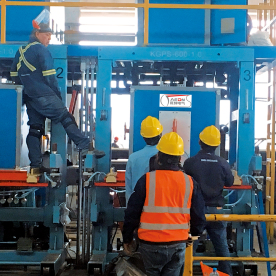****
In the rapidly evolving world of manufacturing, efficiency and precision are paramount. As industries grow and the demand for quality products increases, the importance of specialized equipment becomes undeniable. One such crucial piece of machinery in the manufacturing sector is the pipe making machine. These machines have significantly transformed the way pipes are produced, offering a level of efficiency and precision that manual methods simply cannot match. This article explores the various aspects of pipe making machines, their working principles, applications, advancements in technology, and their impact on the industry.
Understanding Pipe Making Machines
Pipe making machines are specialized equipment designed to manufacture pipes from various materials, including metals, plastics, and composites. These machines can produce pipes of different diameters, wall thicknesses, and lengths based on specific industry requirements. The process typically involves several stages, including material preparation, forming, welding (if required), and finishing. The advanced technology integrated into modern pipe making machines allows for higher production rates, better quality control, and reduced material waste.

An In-Depth Look at Pipe Making Machines: Revolutionizing the Pipe Manufacturing Industry in the Modern Era
Working Principles
The operation of a pipe making machine can vary depending on the type of pipe being produced and the materials used. However, the general working principle remains consistent. Initially, raw materials are fed into the machine, where they undergo a series of processes:
1. **Material Preparation:** The raw material, whether metal coils for steel pipes or plastic pellets for PVC pipes, is prepared for processing. This step may involve cutting materials to size and heating them for easier manipulation.
2. **Forming:** The prepared materials are shaped into tubular forms. For metal pipes, this is typically achieved through a series of rollers that gradually bend and shape the material into a cylinder. In the case of plastic pipes, the material is often extruded through a die.
3. **Welding or Joining:** For some types of pipes, particularly metal pipes, welding is necessary to secure seams and ensure structural integrity. Advanced pipe making machines use automated welding technologies, such as TIG or MIG welding, to produce strong and reliable joints.
4. **Finishing:** Once the pipes have been formed and joined, they go through finishing processes, which may include cutting to length, surface treatment, and quality inspections to ensure they meet industry standards.
Applications of Pipe Making Machines

An In-Depth Look at Pipe Making Machines: Revolutionizing the Pipe Manufacturing Industry in the Modern Era
Pipe making machines are instrumental across a wide range of industries, reflecting their versatility and importance. Here are some of the key applications:
– **Oil and Gas:** Pipes used in the oil and gas industry must withstand high pressures and severe environmental conditions. Pipe making machines produce robust pipes designed for transport and drilling applications.
– **Construction:** Water supply, sewage, and drainage systems in buildings require various types of pipes, which are manufactured using specialized machines.
– **Automotive:** In the automotive industry, pipes are used for exhaust systems, fuel lines, and cooling systems. Pipe making machines facilitate the production of high-strength, lightweight pipes that are essential for vehicle performance.

An In-Depth Look at Pipe Making Machines: Revolutionizing the Pipe Manufacturing Industry in the Modern Era
– **Chemical Processing:** The chemical industry relies on pipes that can handle corrosive substances. Pipe making machines produce materials that meet these specific needs, ensuring safety and efficiency.
Advancements in Technology
Recent advancements in technology have further enhanced the capabilities of pipe making machines. Automation and control systems have been integrated into these machines, enabling real-time monitoring and adjustments during the production process. This leads to improved efficiency, reduced labor costs, and enhanced product quality.
Moreover, the introduction of Industry 4.0 principles allows manufacturers to gather and analyze data from their operations. Smart pipe making machines can predict maintenance needs, optimize production schedules, and even adjust parameters automatically based on changing demands or deviations in product quality.
Conclusion
In conclusion, pipe making machines play a vital role in modern manufacturing, offering unparalleled efficiency and precision in the production of pipes for various applications. As technology continues to evolve, these machines will likely become even more advanced, adapting to the changing needs of industries and contributing to more sustainable manufacturing practices. The modernization of pipe-making technology not only meets the increasing demand for high-quality products but also reflects the ongoing commitment to innovation in the manufacturing sector. For businesses looking to stay competitive, investing in advanced pipe making machines is not just an option—it is a necessity.Durable Spare Parts for Solid State HF Welding Equipment
